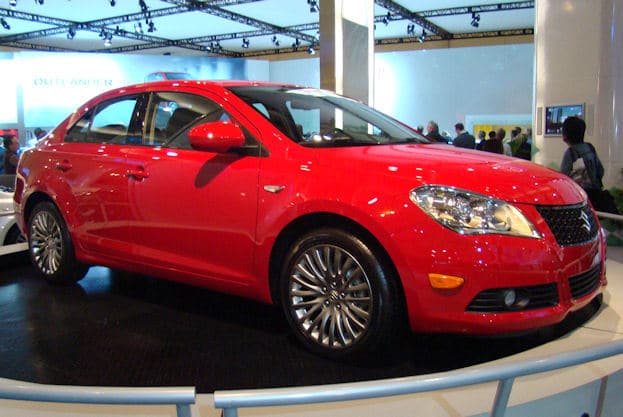Over the past several years, the United States auto industry contained the financial troubles for two of three major domestic brands. While the feat of General Motors and Chrysler Group has been stabilized to the point of prosperity, the country’s auto market will not escape completely intact after 2012. After over 27 years selling vehicles in the United States, Suzuki will stop supplying their automobiles and its American branch will initiate a Chapter 11 bankruptcy restructuring after accruing 346 million dollars in debt on the business.
Citing the inability to turn a profit in the competitive small car and crossover sport utility vehicle sectors, American Suzuki Motor Corporation has cited market conditions as well as a high Japanese Yen as key reasons for discontinuing automobile sales for the United States. The company was also concerned about the rigors for complying to safety and fuel regulations in the United States as reasons that make developing future products.
Founded in 1963 in Brea, California, American Suzuki Motor Corporation initially distributed motorcycles outside of their native Japan. American Suzuki Motor Corporation would add all-terrain vehicles and outboard marine motors over the course of a decade and a half. The global Suzuki corporation built their first automobile in 1955 but it would take various deals with Isuzu and General Motors to make the company a widely distributed brand name of cars and trucks. Though the United States marketplace was introduced to Suzuki unofficially when the Chevrolet Sprint was first sold in 1985, American Suzuki Motor Corporation decided to launch the fun, capable four-wheel drive sport utility called the Suzuki Samurai into the United States for the 1986 model year. A sales so success out of the gate, Suzuki Samurai’s sale in the United States would be cemented as a hard luck story.
As the Suzuki Samurai began to earn a reputation as being a formidable off road vehicle in North America, the Consumer Union (behind the highly respected Consumer Report magazine) issued a warning due to the proneness for rollover. Negatively impacted motorist perceptions of the Samurai, Suzuki ended up suing the Consumer Union. After 8 years of legal action, the automaker and the consumer advocate organization settled but the image damage was already done.
After the Samurai safety concerns, Suzuki automobiles have never achieved blockbuster numbers. During the 1990s into the 2000s, Suzuki’s product line-up was a compilation of “me too” vehicles like the Sidekick and Swift that closely shared identical architecture with those badged by General Motors brands. While the Suzuki SX4 created some waves for the brand in North America as one of the most affordable all-wheel drive new vehicles for many years, efforts selling rebadged Daewoos such as the Reno provided very little excitement in the marketplace. Entering financial difficulty in the 2008, General Motors severed all ties with Suzuki allowing the American Suzuki Motor Corporation produce a small pickup truck from the underpinnings of the Nissan Frontier called the Equator.
In 2010, the debut of the Kizashi was viewed as Suzuki’s attempt to align itself as a global automotive name. Gaining positive press for the Suzuki brand winning the praise of Edmunds.com and Time Magazine, the Kizashi sedan was boosted by what was called “America’s #1 Warranty”. A 100,000-mile/seven-year protection plan on powertrains of Suzuki vehicles have been an ingredient with all new products sold in the United States.
Despite the late efforts, American Suzuki Motor Corporation realized they were fighting too much of an uphill battle inside a congested small car market. While 2,023 vehicles sold in the past month of October is actually above-average compared to previous years, the sale of Suzuki cars in the United States has been judged to be unprofitable. Exiting the car business, the United States Suzuki branch said the Chapter 11 bankruptcy filing was done to allow a smooth transition for setting up service networks for existing Suzuki vehicles. Suzuki is assuring owners of their products that warranties will remained honoured. However, the ability to find parts for Suzuki vehicles could be difficult heading into the future. Another long-term effect likely to plague Suzuki automobiles in the United States will be resale value.
Unlike the United States entity of Suzuki that has filed for bankruptcy in order to wind down their automotive sales as well as restructure their remaining operations, other North American subsidiaries of the Japanese corporation in Canada and Mexico will be unaffected.
Information source: American Suzuki Motor Corporation, Suzuki Motor Corporation
Photo source: American Suzuki Motor Corporation, Chris Nagy



